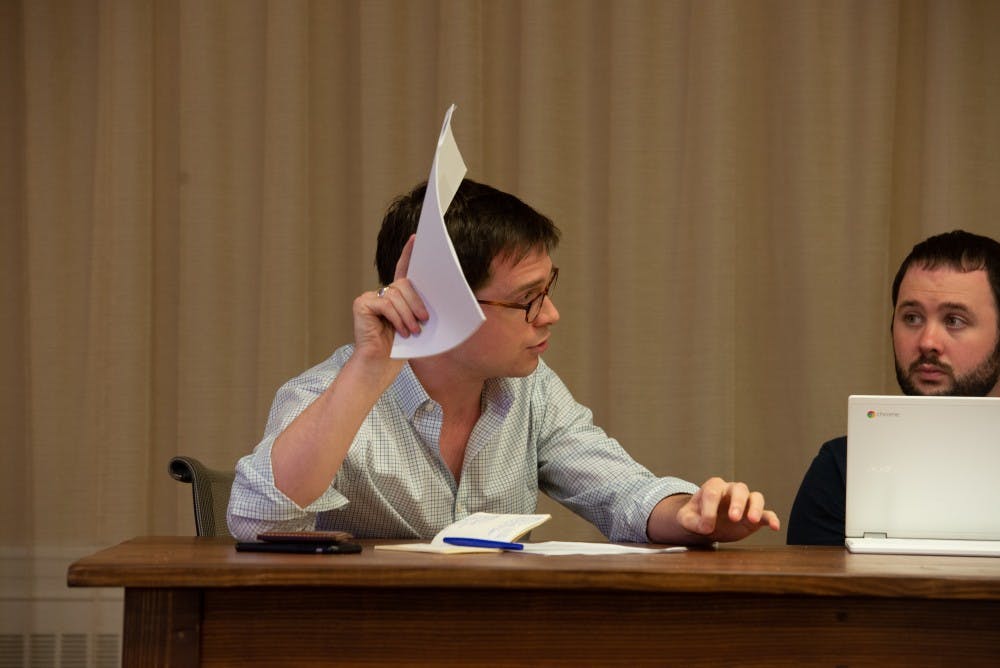The Honor Committee held its first meeting of the school year Sunday evening in Newcomb Hall in which members debated previously proposed changes to the contributory mental disorder process, including changing the name of the process, the removal of a student’s right to appeal a CMD decision and creating more explicit timelines for CMD requirements to be met.
The CMD is a procedure that allows students to request psychological evaluation prior to moving through Honor proceedings in order to determine if a mental health condition contributed to the commission of the offense.
Ankita Satpathy, a fourth-year College student and vice chair for hearings, presided over Sunday’s meeting in the absence of Ory Streeter, a Medicine student and Honor Committee chair.
Law student and representative Lindsay Fisher said during the meeting that the proposed changes to the CMD process have been in the works for nearly two years. Jeffrey Warren, a College alumnus and former vice chair for hearings presented a review of the CMD to the Committee in September 2017, beginning the most recent push to reform CMD procedures.
In particular, Warren proposed altering the timeframe in which a student can request a CMD hearing until only after the case goes through an investigative panel. Currently, a student can take a CMD at any point up until 10 days after the investigative panel.
Currently, CMD procedures can be modified by Honor, but are conducted externally by the Office of the Dean of Students. As the process currently stands, students must admit to an Honor offense to obtain a CMD hearing, which is a psychological evaluation conducted by ODOS and outside professionals. The most recently proposed change would no longer require students to admit to an offense before a CMD hearing.
Last September, Warren also proposed transferring that decision to the Committee, with a psychologist assisting.
“By removing the requirement of explicitly admitting an act, the intention behind these potential changes is to make the process for requesting accomodations less limiting,” Satpathy said.
One of the Committee’s primary goals in changing the process is to make the process of acquiring a CMD easier and more accessible for students who need it.
“We want to make sure that [every] student is afforded the fairest procedure possible,” said Evan Pivonka, special assistant to the Committee, as discussion about the proposed reform began.
The Committee also wants to ensure that all of the proposed changes align with the Americans with Disabilities Act, although members did not provide specific details at the meeting.
The Committee also hopes to create more explicit deadlines for CMD requirements to prevent students from intentionally abusing the CMD process to lengthen a Honor proceeding by waiting until the last minute to fulfill requirements and requesting extensions when unnecessary.
The new policy would be a “catch-all for people who are flat-out non-responsive and don’t have a good reason,” said Derrick Wang, a third-year College student and vice chair for community relations.
However, Satpathy added that a student’s inability to immediately see a doctor as part of a CMD evaluation — due to potentially limited resources at Student Health or Counseling and Psychological Services — should not harm the validity of a CMD claim.
Also included in the proposal is a name change from the Contributory Mental Disorder to Contributory Health Impairment.
While most of the Committee was amenable to the concepts presented, some members had significant reservations. A prominent concern was that the reasoning behind many of the proposed changes hadn’t yet been fully explained. The proposed changes were driven by Honor’s work with students who have moved through the CMD process in the past and were largely drafted by Honor’s legal advisor, Rachel Setear, for consideration by the Committee.
“This is a very large number of changes,” Law School representative Owen Gallogly said. “I would ask that we not vote on the legal proponents of an argument without seeing the actual argument first.”
Wang also expressed concern over parts of the proposal as they stand due to the fact that discussions over the proposal have spanned over various Committees and are thus becoming more incoherent with time and changes in the makeup of the Committee.
“It’s spanned multiple committees now … obviously it feels a little disjointed,” Wang said, also saying that the Committee needed to “examine it closely.”
The Committee will continue to debate the proposed changes over the next several meetings, and although there are a number of critical evaluations that will likely happen prior to a vote on the reform, many members seemed ready to work towards a concrete resolution.
“It’s important to us that we resolve it instead of being a committee that kicks it around for a year,” Satpathy said.
The Committee also briefly discussed support officer recruitment procedures, which started Aug. 30 and will continue through Sep. 8. Support officers are individuals in the Honor system who assist in case processing, provide advisement to accused students and reporters of offenses and conduct outreach throughout the University. This year, the Committee focused more on utilizing Facebook for support officer recruitment and will evaluate its effectiveness in about two weeks when the process is complete.
Additionally, Committee members have or soon will present the fundamentals of the Honor system to first-years in all University schools through either presentations or at a formalized orientation. The Honor system at the University holds all students to a standard of not lying, cheating or stealing.







